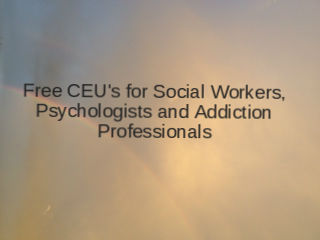
Please check with your state licensing board to verify that your CEU’s will be accepted.
National Association of Social Workers (NASW)
WebEd
NASW WebEd provides a select number of online courses geared toward the social work profession. All courses are accredited and social workers who pass the course exam will receive FREE CEs. Course topic areas include HIV, Healthcare, Cancer, and Ethics.
No cost to non-members.
Lunchtime Series
The NASW Lunchtime Series consists of a monthly hour long webinar exclusively for NASW members. The Lunchtime Series highlights the latest social work issues being addressed by NASW. Besides a live webinar, members can access the transcripts and audio/pod cast component of the teleconference 24/7 through NASW’s Web site. Members may also earn free continuing education units (CEUs) upon successful completion of an online test following select webinars.
Free exclusively to NASW members.
http://www.naswdc.org/ce/online/lunchtime/lcourses/home.aspx
NASW’s Specialty Practice Sections (SPS)
NASW Specialty Practice Sections link you to customized information, news, resources, expertise, and the CEs you need to stay at the forefront of your practice specialty.
NASW currently offers the following specialty practice sections: Administration and Supervision, Aging; Alcohol, Tobacco, and Other Drugs (ATOD); Child Welfare; Children, Adolescents & Young Adults (CAYA); Health; Mental Health; Private Practice; School Social Work; and Social and Economic Justice & Peace; and Social Worker and the Courts.
Free exclusively to NASW members who also are members of a Specialty Practice Section.
United States Department of Veterans Affairs
PTSD: National Center for PTSD
Professional Continuing Education
Take part in one of many free in-depth trainings covering PTSD assessment and effective treatment in the Continuing Education section.
No cost.
Substance Abuse and Mental Health Services Administration (SAMHSA)
Currently these courses are offered:
Prescription Medication (Part 1): Misuse, Abuse, and Dependence
Prescription Medication (Part 2): Addressing Addiction
Organizational Development: Using Financial Information as a Nonfinancial CEO
Organizational Development: Governance and the Board of Directors
Organizational Development: Marketing as Collaboration
Acamprosate: A New Medication for Alcohol Use Disorders
Anger Management for Substance Abuse and Mental Health Clients
NAADAC and NBCC approved.
No cost.
National Crime Victims Research and Treatment Center
Department of Psychiatry and Behavioral Sciences
Medical University of South Carolina
TF-CBT Web
A Web-Based Training Course for Trauma-Focused Cognitive-Behavioral Therapy
9 training modules focused on child trauma and cognitive-behavioral interventions
No cost.
